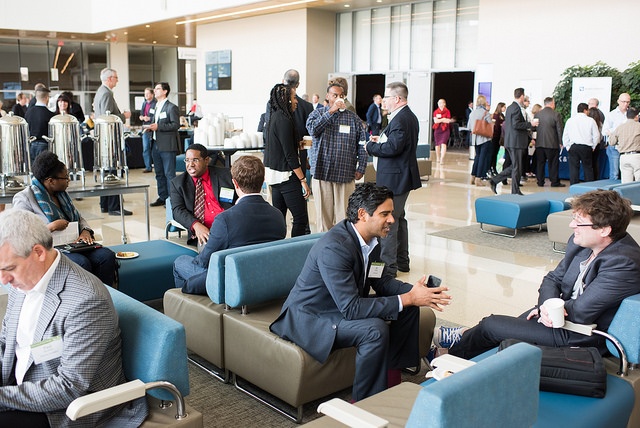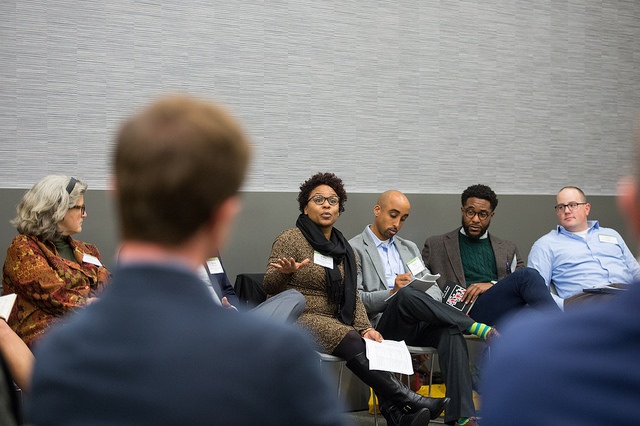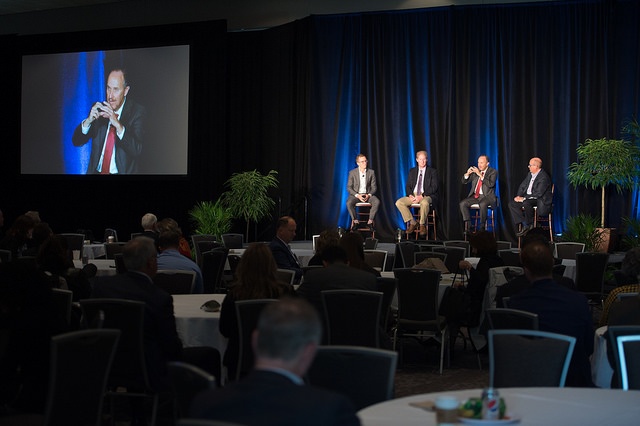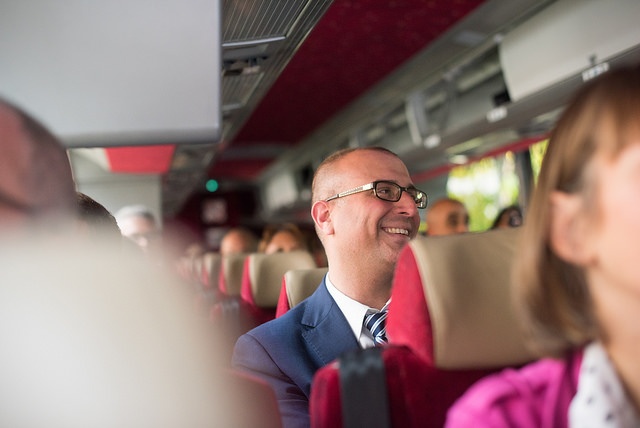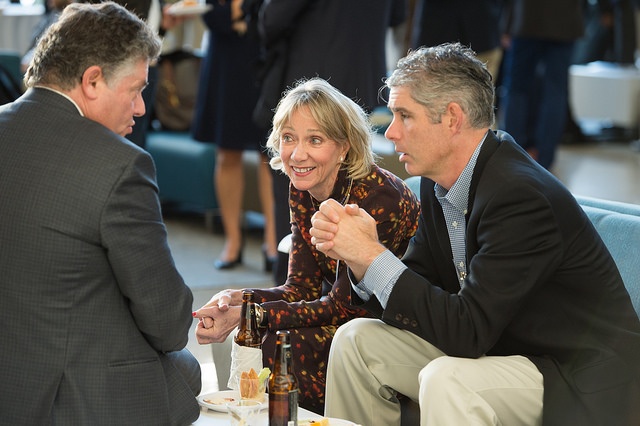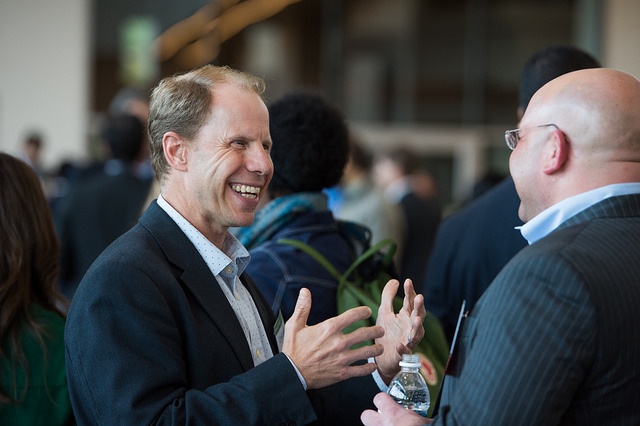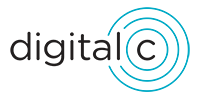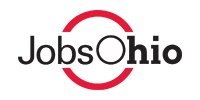Meeting of the Minds 2017 Annual Summit
October 23-25, 2017Cleveland, OH
Spotlighting innovations in urban sustainability and connected technology.
The 11th Annual Meeting of the Minds summit convened in Cleveland, Ohio from October 23-25th at the Global Center for Health Innovation.
This Meeting of the Minds Annual Summit on the shores of Lake Erie unearthed tools and best practices working for city leaders across the globe. The sessions featured solutions that were scalable, replicable and transferable from city-to-city and sector-to-sector. Discussions were couched in a deep understanding of technology and equity as key drivers for innovative cities.


Meeting of the Minds sustainability/technology summit comes to Cleveland in October
7/26/17
Interview with Armond Budish, Jessie Feller Hahn, Jennifer Thomas
9/14/17
350 global thought leaders set to converge on Cleveland for Meeting of the Minds
10/12/17
Interview with Gordon Feller
10/23/17
Interview with Jennifer Thomas, Jerry Frantz, Steve Hamilton
10/24/17
Interview with Jon Coleman
10/24/17
Interview with Greta Byrum
10/24/17
Interview with Candace Widdoes
10/24/17
Interview with Rebecca Ginsburg
10/24/17
Interview with Oktawia Wojcik
10/24/17
Meeting of the Minds summit draws attendees from 150 cities, 20 countries
10/23/17
Black & Veatch, ReThink Advisors Partner to Improve City Prosperity, Security and Sustainability
10/23/17
Meeting of the Minds brings global leaders to Cleveland for urban planning
10/25/17
Interview with Scott Mauvais
10/25/17
Interview with Justin Bibb
10/25/17
Smart Cities - Are They Coming To Ohio?
10/25/17
Making sense of place through data visualization
10/25/17
Interview with Justin Bibb
10/25/17
Interview with Bob Bennett
10/26/17
The Challenges and Opportunities of Driving Innovative Change
10/26/17
Meeting of the Minds 2017 Promoted The Power Of Partnerships And People
10/26/17
Black & Veatch Enters The Next Generation Of Smart City Solutions
11/2/17
Innovations from Cleveland's urban farms are taking root around the world
11/8/17

Delegates
- Public Sector 24%
- Private Sector 36%
- Non-profit sector 30%
- Academic 10%
%
SVP/Director or Higher
Our Location
Cleveland, like many other legacy cities where our Annual Summit has convened, was chosen because it was embarking on an exciting new urban revitalization and smart city strategy across an ecosystem of partners from technology, public sector, philanthropy, academic, community organizations and beyond. Home to major healthcare systems such as the Cleveland Clinic, University Hospitals and MetroHealth and the 3rd largest modern manufacturing state in the US, Cleveland knew how to build economic clusters. It was home to IBM’s Watson, world-class water strategies, a bus rapid transit system, innovative manufacturing, academic institutions which served as anchors for neighborhood revitalization, and a thriving arts culture and economy. Cleveland was tasked with re-skilling its workforce, attracting residents back to the downtown and midtown cores, attracting talent, redeveloping and revitalizing former industrial areas, linking its neighborhoods to multiple waterfronts, and developing a smart city strategy. Much had already been accomplished in the Greater Cleveland area, but, similar to other cities around the world, there were major challenges ahead.
A strong foundation for this important urban revitalization work had been laid by innovative organizations like DigitalC, Microsoft, Cuyahoga County, the Cleveland Foundation, Greater Cleveland Partnership, JobsOhio, JumpStart, the Burton D. Morgan Foundation, the Cleveland Water Alliance, the City of Cleveland, Cleveland Neighborhood Progress, MOCA Cleveland, and dozens of others.

Founded in Cleveland, Ohio, DigitalC aspires to be a leading advocate for the digital transformation of communities across the nation. Find out more at digitalc.org.
Julie Sloat
AEP Ohio
Jannet Walker Ford
Cubic Transportation Systems
Mike Stevens
City of Columbus
Thais Blumenthal de Moraes
Waze
Scott Miller
Toyota Motor North America
Agenda
Meeting of the Minds Annual Summit 2017Welcome to Meeting of the Minds 2017: Setting the Context
- Gordon Feller, Co-Founder, Meeting of the Minds
Transitioning from a Legacy Region to the Next Economy
Cleveland is embarking on an exciting new urban revitalization and smart city strategy across an ecosystem of partners from technology, public sector, philanthropy, academic, community organizations and beyond. Home to major healthcare systems such as the Cleveland Clinic, University Hospitals and MetroHealth and the 3rd largest modern manufacturing state in the US, Cleveland knows how to build economic clusters. What strategies is Cleveland using to transition from a legacy region to a new economy?
- Armond Budish, County Executive, Cuyahoga County, Ohio
Creating the Conditions for City Innovation –The Keys to Regeneration
On the road to building healthy urban communities, some city leaders are embracing different strategies for inclusive urban regeneration. What are the conditions — economic, social, technological, and political -- enabling creative cities who seek to support and sustain high-impact innovations? What key ingredients help entrepreneurs and communities to stand up their experiments, scale them and succeed? What are the support systems - whether they be policies, financing, rules and regulations - that truly help innovators, even those who are not seeking permission from government?
- Moderator: Gordon Feller, Co-Founder, Meeting of the Minds
- Bas Boorsma, Director, Digitization Lead, North Europe, Cisco
- Candace Widdoes, COO, Plug and Play Tech Center
Driving Change to Unwind Intractable Inequality
What are the role of cities as the engines for social protection, inclusion, basic assets, full employment and solving intractable inequality? Hear from one of the leading voices in civic and labor organizing working towards employing the bottom 5% including the anxiously employed and the structurally unemployed. What solutions are working in New Orleans, New Bedford (MA), and other cities around the country that we can all learn from?
- Saket Soni, Executive Director, National Guestworker Alliance and New Orleans Workers Center for Racial Justice
A People-Centered Model for Philanthropy in Cities
People’s Liberty is working to flip philanthropy on its head by granting directly to people. This new model is being tested in Cincinnati as a means to empower and activate residents in order to break cycles of poverty and joblessness and catalyze new kinds of deeper, bigger impacts.
- Eric Avner, CEO, People’s Liberty
Making It Work: Shared Green Infrastructure, Stormwater, and Urban Development
How do we make shared, stacked green infrastructure an amenity across multiple sites between multiple owners and developers? While this might not sound all that revolutionary, it has never been done and is at the core of the future of climate impacts, water scarcity, extreme weather and smart planning. The City of Saint Paul Public Works Department runs as a utility but is working towards encouraging multiple developers and property owners to co-invest and maintain multi-block stormwater and green infrastructure.
- Kathy Lantry, Director of Public Works, Saint Paul, Minnesota
Urban Strategies for Economic Mobility & Opportunity
Cities and states must find new ways to address growing economic inequality and a shrinking middle class. Cities and foundations are developing and implementing new approaches to lift up urban residents and increase economic opportunity by boosting working family incomes, strengthening residents financial capabilities, providing new debt options, expanding job access and pathways to opportunities, and supporting foreign-born entrepreneurs.
- Moderator: Matt Zone, City Councilman, City of Cleveland & President, National League of Cities
- Ronald Richard, President & CEO, The Cleveland Foundation
- Jason Segedy, Assistant to the Mayor, Director of Planning and Urban Development, City of Akron
- Natoya Walker Minor, Chief of Public Affairs, City of Cleveland
Building Towards Resiliency through Healthy Digital Ecosystems
Greta and her team are trying something new in New York: making communities more resilient by building healthy place-based digital ecosystems. Resilient Networks NYC is a multi-stakeholder partnership building local wireless networks in six Superstorm Sandy-impacted neighborhoods. In each neighborhood, New America’s Resilient Communities Program is partnering with a local community organization on the front lines of climate adaptation and economic resilience. Their partners are training local residents as “Digital Stewards” to conduct outreach, collaborate with local businesses and leaders, and design, install, and maintain resilient public WiFi systems.
- Greta Byrum, Director, Resilient Communities, New America
Making More Data-Informed Decisions for Interoperable and Systems-Wide Urban and Regional Change
Can we develop comprehensive data and performance systems that guides a more systems-wide, interoperable and partnership approach to decision-making instead of relying on a pilot or demonstration project? We currently use the “fail or pass” method to introduce policy, and the public either decides it’s a “go” or “no go”. Hear from leaders from multiple regions and sectors who are working on building data systems for more informed decision-making to solve community problems at a system-level with multiple agencies across dozens of municipalities and with the state. We might be better served by discovering what goes well, what could be done better and how to ask questions, collect data and inform decisions through more scientific reasoning. This session will explore how that is starting to emerge in practice and what tools exist that are making this an effective approach.
- Moderator: Susan Chapelle, City Councillor, Squamish, British Columbia
- Scot Rourke, Chief Information and Transformation Officer, Technology, Innovation & Performance, Cuyahoga County, Ohio
- Jennifer James, Director, Smart City Solutions, Black & Veatch
City Data, New Frameworks & Solutions for Health Disparities
How do we compare health outcomes and health disparities within cities and between cities? Does the data exist? What are some innovative data sources, as well as methods, that can be used to gain new insights into the health of cities? Do the policy frameworks exist to understand the data and the implications for its use? Is that knowledge transferred into new healthy community policy approaches? Several new leading edge national projects are beginning to fill that gap. How can we create more localized data to inform and reallocate precious local resources to address health disparities and outcomes? Several projects have been at the forefront of solving the health data challenge:
— 500 Cities - a new localized data portal developed by the RWJ Foundation, CDC and CDC Foundation
— A new data platform that measures life expectancy at birth for every census tract in the country
— Boston Children’s Hospital Digital Health Accelerator which is leveraging nontraditional digital data streams (e.g., social media, search engine data, wearable technologies and mobile devices – collectively known as an individual’s ‘digital phenotype’) for health research and software development.
— Air Louisville - a new solution to addressing low air quality and the associated health risks in the Ohio River Valley air quality with big-data and neighborhood-level solutions.
- Moderator: Oktawia Wójcik, Program Officer, Robert Wood Johnson Foundation
- Dr. Jared Hawkins, Director of Informatics, Innovation and Digital Health Accelerator, Boston Children’s Hospital
- Veronica Combs, Executive Director, Institute for Healthy Air Water and Soil
Workshop Tours
Workshop tours will bring delegates into local Cleveland neighborhoods to connect with a rich array of initiatives, living labs, innovators and organizations working at the cutting edge of urban sustainability and technology. The first three hours consist of behind the scenes, on-the-ground tours led by local leaders. The fourth hour consists of a small group brainstorm and workshop to discuss its scalability, transferability and replicability across cities and sectors. Workshop tours will leave the Global Center for Health Innovation at 1pm and return by 4pm for the workshop portion.
Workshop Tour #1: East to West — Comprehensive Neighborhood Stabilization in Cleveland
Cleveland has made great strides in its efforts to become a “Destination City” thanks to the direct result of significant investment in Downtown development, cross-sector civic leadership, and a robust and effective community development infrastructure. However, the slow and uneven recovery of neighborhoods most severely impacted by deindustrialization and economic decline—i.e. low-income, minority communities—presents a litany of problems, which civic leaders and policymakers must address if the city’s nascent recovery is to be sustained. This tour will provide an in-depth look into Cleveland’s citywide revitalization, and examine a range of strategies intended to stabilize and strengthen neighborhoods throughout the city. The tour will explore a number of neighborhood typologies—from communities described as “ground zero of the foreclosure crisis,” to the city’s hottest real estate markets—and illustrate the need for a balanced and comprehensive approach that responds to the unique context of each neighborhood . Led by Cleveland Neighborhood Progress, participants will learn about the work of local Community Development Corporations; residential rehab and infill development projects; creative placemaking and vacant land reuse projects; P3 strategies in partnership with local real estate developers. The workshop tour will end with an hour-long workshop back at the Global Center for Health Innovation to continue the discussion of best practices, challenges and strategies to create stronger, more equitable, and more inclusive communities.
Workshop Tour Facilitators:
- Mordecai Cargill, Fund Development Manager, Cleveland Neighborhood Progress
- Erika Anthony, Senior Director of Advocacy, Policy and Research, Cleveland Neighborhood Progress
Workshop Tour #2: Reconnecting with the Lakefront and Riverfront: How Multiple Districts Are Redeveloping with a View Towards the Water and Their Residents
This workshop tour will explore Cleveland’s lakefront and riverfront, including Lake Erie and the Cuyahoga River which provide a unique urban fabric: multiple waterfronts, brownfields, and industrial reuse districts that are now seeing over $1B in economic activity. Now, Cleveland is poised to rectify a century-old disconnection by weaving the riverfront back to its lakefront thanks to partnerships, philanthropy and civic leadership - all with the aim of reclaiming urban waterfronts for Cleveland’s residents. Participants will hear from a cross-section of leaders who are working to make these districts thriving, mixed-use, and sustainable, including parks, people-focused amenities, market rate and affordable housing, and more bike paths than any other place in the City of Cleveland. This workshop tour will dive into the policy, financing, and cross-sectoral partnerships that are enabling Detroit Shoreway, Gordon Square and Ohio City neighborhoods to transition from brownfields into a sustainable and vibrant area of Cleveland. The workshop tour will end with an hour-long discussion and brainstorm at the Global Center for Health Innovation to dive deeply into the policies, financing, partnerships and technology solutions that enabled this part of Cleveland to turn itself around and what lies ahead. Be a part of the process and contribute your ideas as its story unfolds.
Workshop Tour Facilitators:
- Matt Zone, City Councilman, City of Cleveland, Ohio
- Jennifer Spencer, Managing Director, Detroit Shoreway Community Development Corporation
- Anthony J. Coyne, President, Mansour Gavin LPA
Workshop Tour #3: Connecting the Urban Fabric
This workshop tour will take participants into the Cleveland Metroparks, including stops at West Creek Reservation, Ohio and Erie Canalway Reservation, the Towpath Trail, Rivergate Park, and the Cleveland Foundation Centennial Trail. Throughout their system, Cleveland Metroparks own more acres than the City of Cleveland, and continues to expand its reach to connect an increasing number of Clevelanders to the many social, health, and environmental benefits parks bring to communities. This workshop tour will highlight the contiguous park system linking the city and its residents to Lake Erie and the Great Lakes - the largest freshwater system in the country.
The tour will include an overview of The Trust for Public Land's Climate-Smart Cities(tm) program and demonstration of a web-based, GIS decision support tool to assist municipalities in the selection of multiple benefit green infrastructure project sites. Participants will have the opportunity to evaluate each of the sites on the tour through use of the tool, demonstrating how Cleveland Metroparks' investments are uniting environmental decision making in park and trail development with equitable investments in low-income neighborhoods, advancing opportunities for public health outcomes in communities, the preservation of the Great Lakes' water quality, and creating a contiguous multi-modal connectivity network for both recreational and daily use. The Climate-Smart Cities program helps cities nationwide create parks and conserve land to meet the climate challenge by deploying multi-benefit green infrastructure solutions to parks and public infrastructure, addressing four key objectives of connect, cool, absorb, and protect.
Discussion will center on how urban parks and connections have catalyzed a revitalization of Cleveland, distributed green infrastructure, informed regional greenspace development strategies, brought about financing strategies, and increased access for low-income communities and communities of color. The workshop tour will end at the Global Center for Health Innovation for an hour-long workshop discussion that will include a hands-on demonstration of the analysis capabilities of the Climate-Smart Cities GIS tool for the City of Cleveland, best practices, as well as strategies that cities are employing around the world to redevelop their waterfronts, green their cities, and scale natural public spaces.
Workshop Tour Facilitators:
- Brian Zimmerman, CEO, Cleveland MetroParks
- Matthew Schmidt, Program Director, The Trust for Public Land
Workshop Tour #4: Innovations in Urban Agriculture — A Collective Effort to Bring Together Food Systems, Jobs, Placemaking, Economic Development and Equity
This workshop tour will bring delegates into several Cleveland neighborhoods to visit multiple organizations and initiatives that are building solutions by bringing together food systems, economic development, job creation, training, and the re-entry population. Visits will include:
- Ohio City Farm - a 6 acre urban farm in a dense neighborhood managed through a collaboration between The Refugee Response and Cuyahoga Metropolitan Housing Authority to provide green job training.
- Evergreen Cooperative - a worker-owned cooperative and 3.5 acre hydroponic greenhouse that leverages the purchasing power of anchor institutions to create opportunities for employment and community wealth building
- Vineyards of Chateau Hough - an urban vineyard and BioCellar that returned vacant land into productive use and provides job training and employment for the re-entry population
- Rid-All Green Partnership - a transformed empty and forgotten piece of land in Cleveland’s Kinsman Neighborhood now an urban farm which produces healthy, local food to area institutions and citizens and training for local residents
Workshop Tour Facilitators:
- Randy McShepard, Co-Founder, Rid-All Green Partnership
- Brett Jones, Director of Strategic Projects, Evergreen Cooperative Cooperation
- Jeremy Lisy, VP of Sales and Specialty Greens, Green City Growers, Evergreen Cooperative
- Mansfield Frazier, Founder, Château Hough
- Patrick Kearns, Executive Director, The Refugee Response
Workshop Tour #5: The Power of Data & The Future of the Great Lakes and Water Strategies in American Cities
The workshop tour will take participants to Northeast Ohio Regional Sewer District’s green infrastructure project site locations, how a region manages 21% of the world’s freshwater surface water, and discuss how Lake Erie projects are using data and cross-sectoral, regional cooperation to solve complex water challenges. These locations demonstrate the use of green infrastructure in addressing combined sewer overflows as well as the benefit of public-private partnerships in the clean water industry. Further, there will be a discussion about how the Northeast Ohio Regional Sewer District and the Cleveland Water Alliance are developing an innovative regional ecosystem through a collaboration model - Erie Hack (http://eriehack.io/) - between Cleveland, Toledo, Detroit, Erie, Windsor, and Buffalo. The workshop tour will return to the Global Center for Health Innovation for a discussion related to gray and green infrastructure innovations, Project Clean Lake - the Sewer District’s $3B in combined sewer overflow program, and the role of data in watershed management.
Workshop Tour Facilitators:
- Bryan Stubbs, Executive Director, Cleveland Water Alliance
- Matt Scharver, Manager of Watershed Programs, Northeast Ohio Regional Sewer District
Workshop Tour #6: NASA Glenn Research Center Tech Transfer: Sensors, Robotics, Micro-Grids, Renewables & Water Tech
This workshop tour will take delegates to NASA Glenn Research Center (NASA GRC) - one of ten NASA Centers - to see first-hand research, technology, and innovative solutions being transferred out of NASA for real-world applications. Participants will learn about NASA’s Technology Transfer Program and Regional Economic Development activities. Participants will hear from NASA GRC’s Chief Technologist and interact with subject experts as they demonstrate innovative technologies in the areas of algal bloom detection, developments in icing research, rovers, micro-grids, renewables, water technology, advanced materials, and more. The workshop tour will feature NASA GRC’s unique facilities such as the icing research tunnel, electric propulsion lab, and more. Don’t miss this opportunity to see how NASA GRC brings NASA technology down to Earth.
Workshop Tour Facilitators:
- Frank Jennings, Deputy Chief, Office of Communications & External Relations
- John Sankovic, Center Chief Technologist, NASA Glenn Research Center
- Harvey L. Schabes, Chief, Technology Transfer, NASA Glenn Research Center
Workshop Tour #7: Future Urban Applications of Robotics, AI, and Sensor Networks: From the HoloLens to IoT
Participants will visit Case Western Reserve University’s Interactive Commons, home to the country's first academic application of HoloLens, as well as an emerging public-private partnership focused on building a robust academic IoT Collaborative with high regional impact.
- The Interactive Commons is meant to create a place and process to encourage radically different academic disciplines to begin new conversations, exchange knowledge and find new ways to look at complex problems. The Microsoft HoloLens blends the digital world with the real world through a headset that projects holograms into the wearer’s visual field for a highly realistic and immersive experience. The opportunities of this transformational technology must not be understated. Case and Microsoft envision application for work, gaming, teaching, deployment of public policy and new ways to explore places we’ve never been—from distant planets to places in history. The applications for cities are immense, particularly in helping citizens and policymakers make sense of vast data sets and visualize robust community solutions. Participants will be able to experience the HoloLens on campus.
- The new IoT Collaborative is a partnership between Case Western, Cleveland State, industry and public sector partners which will provide a front door for organizations and industry to tap into an ecosystem of research and education partners to solve complex IoT challenges by involving faculty and students from departments representing technology, policy, legal, business, and social perspectives. Participants will be able to learn and contribute to this emerging initiative as it is being formed and developed.
The workshop tour will end with an hour-long workshop at the Global Center for Health Innovation to ask questions, discuss next steps, and share global AI and IoT best practices as well as models for cross-sector partnerships.
Workshop Tour Facilitators:
- Lisa Camp, Associate Dean for Strategic Initiatives, Case School of Engineering, Case Western Reserve University
- Mark Griswold, Professor of Radiology, Director of MRI Research and Director of the Interactive Commons, Case Western Reserve University
- Erin Henninger, Executive Director, Interactive Commons, Case Western Reserve University
- Kenneth Loparo, Case School of Engineering, Faculty Leader of IoT Collaborative, Case Western Reserve University
- Dave Martin, Founder, President & CEO, Intwine Connect
- Michael Regelski, Senior Vice President & Chief Technology Officer, Electrical Sector, Eaton
- Nigamanth Sridhar, College of Engineering, Faculty Leader of IoT Collaborative, Cleveland State University
- Leon Wilson, Chief of Digital Innovation and CIO, The Cleveland Foundation
Workshop Tour #8: Cleveland’s Regional Transportation Strategies: BRT, Rail, and P3’s
Join the Greater Cleveland Regional Transit Authority’s CEO - Joseph Calabrese - to learn how Cleveland planned, implemented and delivered the HealthLine - Cleveland's first Bus Rapid Transit (BRT) system. Under the spotlight will be a discussion around funding, technology, bus and rail connections, and partnering with the private sector. The HealthLine connects the two largest regional employment centers, Downtown and University Circle, and extends to the Louis Stokes Station at Windermere in East Cleveland. The HealthLine was named the 'Best' Bus Rapid Transit in North America by the Institute for Transportation & Development Policy, and was recognized for having the best return on investment for a transit project, regardless of mode, in the country. The $200 million HealthLine delivered more than $6.3 billion in economic development along the Euclid Corridor -- a staggering $114 gained for every dollar spent on creating and launching the new service. The HealthLine:
- Includes 9.2 miles of roadway improvements on and adjacent to Euclid Avenue
- Offer convenient, five-minute frequency service during peak travel periods and operates 24-hour-a-day, seven-day-per-week
- Replaced 108 bus stops with 36 conveniently spaced stations and reduced travel time from 40 minutes to 28
- Provides stylized 63-foot hybrid-electric Rapid Transit Vehicles with five sets of doors, located on both sides of the coach
The workshop tour will end at the Global Center for Health Innovation for an hour-long workshop and group brainstorm centered around solutions and strategies for BRT, regional transportation systems, and first and last-mile mobility solutions around the world.
Workshop Tour Facilitators:
- Joseph Calabrese, CEO and General Manager, Greater Cleveland Regional Transit Authority
- Jon Coleman, Director, City Solutions, Ford Smart Mobility
- Edward Fanter, Specialist Leader, Deloitte
Workshop Tour #9: Connecting the Unconnected - Broadband Access, Training, and Workforce Readiness
In Cleveland, more than a third of the city’s residents do not have access to the Internet in any form, and as many as half of the city’s residences have no fixed wired home internet access. This workshop tour will begin with a visit to the Cedar Extension High Rise, a public housing facility operated by the Cuyahoga Metropolitan Housing Authority (CMHA). DigitalC, CMHA and a broad coalition of technology, equipment and community partners will demonstrate their first-of-a-kind pilot program, Connect the Unconnected that supports 156 households at Cedar by bringing them online, providing devices for each household, and providing digital literacy training as well as opportunities for additional digital workforce readiness training. Once broadband is in place, basic digital literacy training and curriculum is followed by the opportunity for residents to enroll in DigitalC’s ReStart Program. With funding assistance from The Cleveland Foundation, ReStart provides participants a pathway to learning intermediate technology skills in software and hardware through industry recognized certification classes. Participants will learn about the program, hear from technology partners Siklu - an Israeli company providing the millimeter wave wireless solution and Actelis - a Sunnyvale telecommunications leader bringing high speed bandwidth on existing copper wires, as well as Cedar High Rise residents first hand accounts of how the programming has impacted them. Additional tour stops include RET3, a non-profit operator of a full service electronics collection, storage, reuse and refurbishment program and provider of the devices for Connect the Unconnected; and Lutheran Ministry’s, operator of the largest men’s homeless shelter in the state of Ohio, now receiving gig connectivity through Connect the Unconnected and training in digital literacy skills through ReStart. DigitalC is the catalyst bringing together over 30 organizations to make Connect the Unconnected and ReStart happen, showcasing the true power and possibilities that public/private/nonprofit partnerships can bring.
Workshop Tour Facilitators:
- Liz Forester, Director of Programs & Partnerships, DigitalC
- Donald Butler, Information Technology Director, Cuyahoga Metropolitan Housing Authority
- Juleian Curtis, Planning Coordinator, Cuyahoga Metropolitan Housing Authority
- Patrick Holland, Management Team, RET3 JOB Corp
- Joe Kenyon, Vice President, Global Customer Service & Support, Actelis
- Izik Kirshenbaum, Co-Founder, Chairman and President, Siklu, Inc.
- Ken Kovatch, Founder & Executive Director, RET3 Job Corp
- Erin Kray, Associate Director of Housing and Shelter, Lutheran Metropolitan Ministry
- Jeffery Patterson, CEO, Cuyahoga Metropolitan Housing Authority
- Michael Sering, VP, Lutheran Metropolitan Ministry
Workshop Tour #10: The Arena as a Test-Bed for Smart Technologies & Sports as Drivers of Downtown Core Revitalization
Tour the Cavaliers arena with the CEO and CIO as we explore two exciting facets of the sports industry: how the industry can impact and transform an urban core and how the arena serves as a petri dish for new emerging technologies that can be scaled and replicated to the city-scale. The Cav's arena is a unique, dense space during games that provide a "mini-city" to better understand and experiment with density, emitting signals, new wayfinding, digital displays, master controls, beacon technology, GPS, machine-learning, and automation. The Cavs have a dedicated person on staff to vet new emerging technologies and vendors in order to choose and test out technologies at a scale that very few spaces can. The CEO will share the latest research on how the sports industry impacts urban cores and the neighboring areas around the arena.This workshop tour will also hear from the Cleveland Indians CIO - Neil Weiss - who will share what the Cleveland Indians stadium - Progressive Field - has been working on and planning related to emerging and new technologies. The workshop tour will end at the Global Center for Health Innovation for a group brainstorm and discussion about these themes.
Workshop Tour Facilitators:
- Len Komoroski, CEO, Cleveland Cavaliers
- Michael Conley, Senior Vice President and Chief Information Officer, Cleveland Cavaliers
- Neil Weiss, Senior Vice President and Chief Information Officer, Cleveland Indians
Networking Reception
Students from the Young Entrepreneur Institute will showcase their products during the reception. Stop by their tables to purchase items and vote for Best Pitch, Best Product and Best Display.
Location: Global Center for Health Innovation
Welcome to Day 2 of Meeting of the Minds 2017
- Gordon Feller, Co-Founder, Meeting of the Minds
Unleashing Waze Data in 250 Cities Around the World
Waze is working with 250 partner cities and adding new partners at lightning speed. This data exchange partnership is changing the way cities develop policies, respond to crises, plan for new transit and mobility, and manage their spaces. With dozens of case studies in their pocket, Thais will share how Waze captures data previously unavailable, partners with cities, and unleashes mobility and infrastructure innovation in more than 250 cities around the world.
- Thais Blumenthal de Moraes, Global Business Development, Connected Citizens Program, Waze
The Evolution of Vehicle Safety: The Intersection of Automation and Human Behavior
Technological innovation in transportation automation over the coming decades offers a promise to disrupt how we live and move. The ability of society to adapt to the pace of change is being increasingly challenged. How will we safely transition drivers, and other road users, into a mixed fleet environment? How can urban planners and policymakers accelerate the local benefits of such technology? What can lessons from the past tell us about the need for consumer education, public policy, and a human centric design philosophy?
- Moderator: Scott Miller, General Manager, Collaborative Safety Research Center, Toyota Motor North America
- Bryan Reimer, Research Scientist, MIT AgeLab & Associate Director, New England University Transportation Center, MIT
- Jeffrey Michael, Associate Administrator, Research and Program Development, National Highway Traffic Safety Administration
How Miami Has Come Out Ahead in the Transit Industry
The transit industry is notoriously behind in adopting cloud solutions and integrating next generation payment and applications for its riders. Yet Miami has consolidated its roads, transportation and public works departments in an effort to upgrade their system, move to the cloud, implement contactless payment and show how a city can change their governance model to make multi-modal transit easier for its residents. Hear from the three major partners - Cubic, Microsoft, and Miami-Dade County - on how they have implemented this multi-phase, rapid approach ahead of other US cities.
- Moderator: Bill Mitchel, Senior Director, Worldwide Public Sector, Microsoft
- Jannet Walker Ford, Vice President & General Manager, Eastern Region, Cubic Transportation Systems
- Carlos Cruz-Casas, Assistant Director, Transportation Strategic Planning, Miami-Dade Department of Transportation and Public Works
Putting People First: Analysis Can Place Citizens at the Center of Smart City Projects
Urbanova, the smart city living lab in Spokane, Washington’s University District, and Gallup, the global analytics and advisory company, have teamed up to identify smart city projects that matter to citizens. During this session, the group will discuss the results of their people-centered research, involving qualitative in-depth interviews, discussions with key stakeholders, and a comprehensive local, regional and national data review to uncover public priorities that smart city projects can address. Discover how Urbanova is delivering on its commitment to identify citizen-driven applications that matter to people and that strive for social, environmental and economic resiliency and equity?
- Moderator: Gordon Feller, Co-Founder, Meeting of the Minds
- Justin Bibb, Senior Adviser, Gallup
- Kim Zentz, Co-Founder and Director, Urbanova
- Heather Rosentrater, Vice President, Energy Delivery, Avista
Unlocking the Keys to Refugee Integration
To realize their prosperity dreams, cities overcome challenges — just as refugees do. Shelly Callahan runs the Mohawk Valley Resource Center for Refugees in Utica, NY where her one-stop shop has resettled, trained, and integrated more than 16,000 refugees into the community. Her partnership with the Mayor, community college, county executive, police department, economic development commission and other key institutions has enabled this city to thrive with open arms. Shelly will recount their approach, strategies, and success stories that have enabled waves of refugees to not only benefit from new urban economic opportunities but to become a linchpin of those developments and of the community.
- Shelly Callahan, Executive Director, Mohawk Valley Resource Center for Refugees
What’s Working: Training & Entrepreneurship for the Next Global Workforce
Potent economic forces are on the move, altering urban economies while reshaping the workforce. Are we prepared to meet changing workforce demands? What skills and knowledge will help ensure an anxious workforce, particularly youth who are expected to drive innovation? How do we ensure low-income communities share in the economic success? What is the role for philanthropic and public sector leadership in addressing preparedness and inequities?
- Moderator: Nicolette Jaworski, Director, External Affairs, AT&T
- Greg Malkin, Director, Young Entrepreneur Institute and Leadership Center
- Tayyib Smith, Co-founder, Institute of Hip Hop Entrepreneurship
Climate and Building Lessons from Arid Middle Eastern Cities
What can we learn from arid cities in the Middle East for our own local context? This session will address common challenges across arid cities globally and innovative solutions at the city, neighborhood and building scales with best practices from the Middle East.
- Huda Shaka, Associate Director, Arup (United Arab Emirates)
Preparing for the Moonshot: Effective Models for Industry Engagement
How do cities establish the conditions for technology partnerships? For emerging and breakthrough technologies to be tested? Based on Jeremy's experience in cities of San Jose, San Francisco and now in the NYC Mayor’s Office, learn how his partnership work and experience is now informing the next wave of urban technology, innovation and experimentation in New York.
- Jeremy Goldberg, Director of Emerging and Breakthrough Technology, New York City Mayor’s Office of Tech and Innovation
Fresh Perspectives in City Government: The Challenges and Opportunities of Driving Innovative Change
What does it really take to implement innovative solutions in local government? It’s never easy, but cities across the country are embracing new approaches in order to respond to continually evolving challenges. This session will spotlight the work of FUSE Corps, a national nonprofit that places experienced private-sector leaders into local government in order to more effectively address some of the most pressing issues facing urban communities. Speakers include FUSE’s CEO and four recent FUSE fellows who are leading groundbreaking work around climate change planning in New Orleans, autonomous vehicle readiness in Los Angeles, violence prevention in Long Beach, and government accountability in San Francisco.
- Moderator: James Weinberg, CEO, FuseCorps
- Michael Lim, FUSE Fellow, City of Los Angeles, Department of Transportation
- Veronica Njodinizeh, FUSE Fellow, City of Long Beach, Office of the City Manager
- Gayathri Thaikkendiyil, FUSE Fellow, City of San Francisco, Office of the Ethics Commission
Smart Columbus: What Can We Learn?
The ‘Smart Columbus' collaboration strategy has led to a $500M (and growing) Acceleration Fund, made up of aligned investment by the public and private sectors that will compliment, scale and sustain the initial DOT and Vulcan funding. What can we learn from the ‘Columbus Way’ of bringing public and private together, thereby turning very complicated partnerships into real partnership agreements. The focus of this session will be on identifying the key ingredients that enable a city to experiment and deliver on big ideas - something that few cities have been able to do.
- Moderator: Paul L. Wellener, IV, Managing Principal, Deloitte LLP, Northeast Ohio
- Mike Stevens, Chief Innovation Officer, City of Columbus
- Mark Patton, Vice President, Smart Cities, Columbus Partnership
- Julie Sloat, President & Chief Operating Officer, AEP Ohio
The Internet of X
We are currently looking at the Internet of Things but what is after the “T”? What is "X"? Three start-up founders focused on internet enabled urban impact will share their disruptive technology solutions for more sustainable, connected, healthy and inclusive cities that we are only just starting to wrap our heads around.
The internet of medicine: Jeff LeBrun, Co-Founder & CEO, Pillsy
The internet of food: Elliot Roth, CEO, Spira, Inc.
The internet of work: Gabe Batstone, CEO, Contextere
Getting Ahead of AI for Smarter Cities
This session will tackle the benefits and tradeoffs of AI for smart cities. Are we getting improved efficiency and becoming more effective with personalized products and services? What are the downsides? What biases are we bringing into our effort to create smarter cities? Is there a way to create a win-win? New research from Microsoft and McKinsey point to the fact that it is much more nuanced than we previously thought and we have a rare and limited opportunity to shape AI before it gets the better of us.
- Moderator: Scott Mauvais, Director, Technology and Civic Innovation, Microsoft
- Gabe Batstone, CEO, Contextere
- Melanie Nutter, Principal, Nutter Consulting
Coffee Break
Three Revolutions: What Cities Need to Do To Prepare for Disruption
Pittsburgh’s Director of Mobility and Infrastructure and Audi’s Director of Government Affairs will discuss how cities need to prepare for the 3 Revolutions - electrification, autonomous vehicles, and shared mobility. Decisions on how to reinvent infrastructure need tobe made now but it’s crucial for innovators and cities to be in constant dialogue. How do we ensure the decisions we make now won’t be obsolete in 10 years? Karina Ricks will discuss how Pittsburgh has become one of the hot spots for urban innovation, risk-taking,and success. She will share how the city has adopted a new and bold vision and some of its key strategies including Uber AV pilot learnings, smart street lights, data utility concept and its use of Peak Analytics.
- Moderator: Josh Sperling, Urban Futures and Energy-X Nexus Engineer, National Renewable Energy Lab
- Karina Ricks, Director of Mobility and Infrastructure, City of Pittsburgh
- Brad Stertz, Director, Government Affairs, Audi
Regional Collaboration and Technology Models for City Government
Boston and Cambridge are embarking on bringing the two cities together to serve residents on a regional basis through several strategies: sharing data on ridership and bus stop locations, first and last mile needs, technology platforms for ‘smart bus stops’, real-time traffic and transit, disability access and more. What are the main challenges ahead? Where can new projects like these garner enough support, meet the real needs of residents across jurisdictions and pay for these new initiatives?
- Moderator: Jim Aloisi, Principal, Trimount Consulting
- Joe Aiello, Chair, MBTA Fiscal Management and Control Board
- David Block-Schachter, Chief Technology Officer, Massachusetts Bay Transportation Authority
- Joseph Barr, Director of Traffic, Parking & Transportation, City of Cambridge
Cities Getting it Right: Access to Transportation Choice
How are cities around the world solving their multi-modality challenges? In her work developing the Go Boston 2030 Plan, Alice Brown has looked into global best practices for how cities are moving towards a new transportation paradigm. Rather than frame transportation as a ‘mobility’ challenge, we should reframe it as an ‘accessibility’ challenge. Do residents have a range of options for accessing to jobs, housing, healthcare, family, services, parks, schools, childcare, and other essential services? How is access restricted by geography, infrastructure, cost, or information? In her current work expanding water transportation options for the people of Greater Boston and in her previous planning work, she has seen first-hand what it takes to get people to travel differently and what it takes to support behavior change.
- Alice Brown, Director of Water Transportation, Boston Harbor Now
Pre-Entry Rather than Re-Entry
Rather than re-entry, what if we focused on “pre-entry”? What challenges do people face upon release from prison, and what more can be done—before they leave prison—to produce healthy, productive outcomes for them, their families, and the cities that most of them return to? Rebecca encourages us to re-imagine what reentry might look like. She is breaking through molds and cutting through systemic challenges to bring skills and hope to formerly incarcerated individuals here and abroad.
- Rebecca Ginsburg, Co-Founder & Director, Education Justice Project
Making Sense of Place through Data Visualization
We’ve never had more access to data. The problem is keeping track of all the indicators now available, and organizing them for meaningful analysis – making sense of place. The Lincoln Institute of Land Policy and PolicyMap have developed a new data visualization tool that allows the mapping of numerous indicators associated with land use and land policy – including local zoning, levels of affordable housing, federal government spending, brownfields sites, structurally deficient bridges, conservation easements, and more. The tool, which is being unveiled at Meeting of the Minds, was designed to include several years’ worth of data, allowing analysis of change over time. Users can see certain data at the state level, and zoom in to see data as granular as a block group. Datasets in the tool come from a variety of resources, such as the U.S. Environmental Protection Agency, U.S. Census, Internal Revenue Service, and National Conservation Easement Database -- assembled for the first time all in one place, and packaged for visualization.
- Anthony Flint, Fellow & Director of Public Affairs, The Lincoln Institute of Land Policy
- Bernie Langer, Senior Data Analyst, PolicyMap
Closing
- Jessie Feller Hahn, Executive Director, Meeting of the Minds
- Gordon Feller, Co-Founder, Meeting of the Minds
Closing Networking Reception
Location: Global Center for Health Innovation

